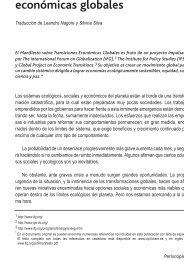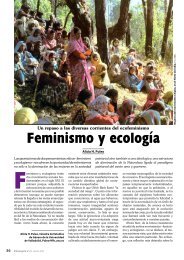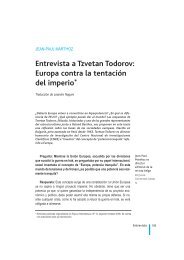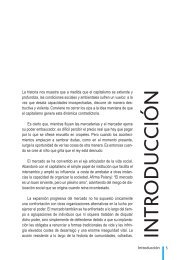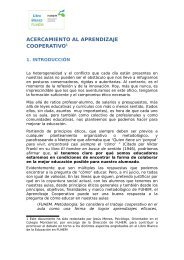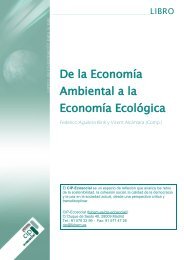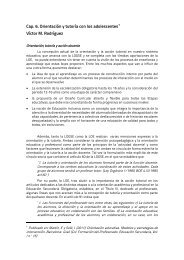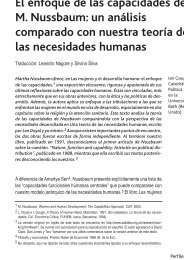CRISTINA BORDERÍAS, CRISTINA CARRASCO Y TERESA TORNSDURÁN, María Ángeles, y GARCÍA, Cristina (1997). Fuentes bibliográficas sobre <strong>trabajo</strong> noremunerado. Madrid: CSIC, Comunidad <strong>de</strong> Madrid y Consejería <strong>de</strong> Economía yEmpleo.EICHNREICH, Barbara, y ENGLISH, Deirdree (1973). For her Own Good. Nueva York: BantanDoubleday. [Traducción castellana en Por su propio bien, 150 años <strong>de</strong> consejos <strong>de</strong>expertos a las mujeres. Madrid: Taurus, 1990.]— (1975). “The Manufacture of Housework”, Socialist Revolution 26: 5-41.ELSON, Diane (1997). Integrating Gen<strong>de</strong>r Issues into National Budgetary Policies and Procedureswithin The Context of Economic Reform: Some Policy Options, PreparatoryCountry Mission to Integrate Gen<strong>de</strong>r into National Budgetary Policies and Procedure.Londres: Commonwealth Secretariat.— (1998). “Integrating Gen<strong>de</strong>r Issues into National Budgetary Policies and Procedures:Some Policy Options”, Journal of International Development 10: 929-941.— (2003). “Iniciativas <strong>de</strong> presupuestos sensibles al género: dimensiones claves yejemplos prácticos”, en DE VILLOTA, Paloma (ed.), Economía y Género. Barcelona:Icaria Editorial.ESPINO, Alma (2001). “Análisis <strong>de</strong> género <strong>de</strong> las políticas comerciales”, en TODARO,Rosalba, y RODRÍGUEZ, Regina (eds.), <strong>El</strong> género en la economía. Santiago <strong>de</strong> Chile:Ediciones <strong>de</strong> las Mujeres.ESQUIVEL, Valeria, BUDLENDER, Debbie, FOLBRE, Nancy, y HIRWAY, Indira (2008).“Explorations: Time-use surveys in the south”, Feminist Economics 14 (3): 107-152.EUROSTAT (2003). Household Production and Consumption. Proposal for a Methodologyof Household Satellite Accounts. Working Papers and Studies. Luxemburgo: EURO-STAT.EVERTSON, Maire, y NERMO, Magnus (2007). “Changing Resources and the Divisions ofHousework: A Longitudinal Study of Swedish Couples”, European SociologicalReview 23 (4): 455-470.FEDERICI, Silvia (2004). Caliban and the Witch. Nueva York: Autonomedia. [Traduccióncastellana en Calibán y la bruja. <strong>El</strong> cuerpo y la acumulación primitiva. Madrid: Traficantes<strong>de</strong> Sueños, 2010.]— (2009). “Anmerkungen uber Altenpflegearbeit und die Grenzen <strong>de</strong>s Marxismus”,en VAN DER LINDEN, Marcel, y ROTH, Karl-Heinz (eds.), Über Marx hinaus Arbeitsgeschichteund Arbeitsbegriff in <strong>de</strong>r Konfrontation mit <strong>de</strong>n globalen Arbeitsverhältnissen<strong>de</strong>s 21. Berlín: Jahrhun<strong>de</strong>rts. Unter Mitarbeit von Max Henninger.FERBER, Marianne, y NELSON, Julie (1993). Beyond Economic Man. Chicago: Universityof Chicago Press. [Traducción castellana en Más allá <strong>de</strong>l hombre económico. Valencia:Cátedra, 2004. Colección Feminismos, 81.]FINCH, Janet, y GROVES, Dulcie (1983). A labour of love: women, work and caring.Londres: Routledge-Kegan.FINEMAN, Martha (2004). The Autonomy Myth. A Theory of Depen<strong>de</strong>ncy. Nueva York: TheNew Press.— (2006). “Depen<strong>de</strong>ncy and Social Debt”, en GRUSKY, David, y ENGLAND, Paula (eds.),Poverty and Inequality. Stanford: Stanford University Press.FLORO, María Sagrario (1995). “Economic Restructuring, Gen<strong>de</strong>r and the Allocation ofTime”, World Development 23 (11): 1913-1929.FLORO, María Sagrario, y PICHETPONGSA, Anant (2010). “Gen<strong>de</strong>r, Work Intensity andWell-Being of Thai Home Based Workers”, Feminist Economics 16 (3): 5-44.FOLBRE, Nancy (1991). “The Unproductive Housewife: Her Evolution in NineteenthCentury Economic Thought”, Signs 16 (3): 463-484.86
INTRODUCCIÓN— (1994). Who Pays for the Kids? Londres-Nueva York: Routledge.— (1995). “Holding Hands at Midnight: The Paradox of Caring Labor”, Feminist Economics1 (1): 73-92.— (2001). The Invisible Heart: Economics and Family Values. Nueva York: The NewPress.— (2005). “By what Measure? Family Time <strong>de</strong>voted to Children in United States”,Demography 42 (2): 373-390.— (2006). “Measuring Care: Gen<strong>de</strong>r, Empowerment, and the Care Economy”, Journalof Human Development 7 (2): 183-199.— (2008). Valuing Children. Rethinking the Economics of the Family. Harvard UniversityPress.FOLBRE, Nancy, y BITTMAN, Michael (2004). Family Time. Londres-Nueva York:Roudledge.FOLBRE, Nancy, SHAW, Lois, y STARK, Agneta (2007). Warm hands in cold age. Londres-Nueva York: Routledge.FOLBRE, Nancy, y YOON, Jayoung (2008). “<strong>El</strong> cuidado <strong>de</strong> los niños: lo aprendido medianteencuestas sobre el uso <strong>de</strong>l tiempo en algunos países <strong>de</strong> habla inglesa”, enORGANIZACIÓN PANAMERICANA DE LA SALUD, La economía invisible y las <strong>de</strong>sigualda<strong>de</strong>s <strong>de</strong>género. Washington.FRAISSE, Geneviève (2000). “Servidumbre, empleos <strong>de</strong> servicio y <strong>de</strong>mocracia”, enMARUANI, Margaret, ROGERAT, Chantal, y TORNS, Teresa (eds.), Las nuevas fronteras <strong>de</strong>la <strong>de</strong>sigualdad. Hombres y mujeres en el mercado <strong>de</strong> <strong>trabajo</strong>. Barcelona: Icaria.FRIEDAN, Betty (1963). The feminine mystique. Nueva York: Norton and co. [Traduccióncastellana en La mística <strong>de</strong> la feminidad. Madrid: Júcar, 1974.]FUKUDA-PARR, Sakiko (1999). “What does Feminization of Poverty Mean? It Isn’t JustLack of Income”, Feminist Economics 5 (2): 99-103.— (2003). “The Human Development Paradigm: Operationalizing Sen’s I<strong>de</strong>as onCapabilities”, Feminist Economics 9 (2-3): 301-317.GALCERÁN, Montserrat (2009). “Prólogo”, en DALLA COSTA, Mariarosa (2009), Dinero,perlas y flores en la reproducción feminista. Madrid: Akal.GÁLVEZ, Lina (2000). La Compañía arrendataria <strong>de</strong> tabacos, 1887-1945. Madrid: LID.GARCÍA SAINZ, Cristina (2005). “Aspectos conceptuales y metodológicos <strong>de</strong> las encuestas<strong>de</strong> uso <strong>de</strong>l tiempo en España”, en AGUIRRE, Rosario, CARRASCO, Cristina, y GARCÍASAINZ, Cristina, <strong>El</strong> tiempo, los tiempos, una vara <strong>de</strong> <strong>de</strong>sigualdad. Santiago <strong>de</strong> Chile:CEPAL, Serie Mujer y Desarrollo, 65.GARDINER, Jean (1997). Gen<strong>de</strong>r, Care and Economics. Londres: MacMillan.GASPER, Des (2007). “What is the capability approach? Its core, rationale, partnersand dangers”, The Journal of Socio-Economics 36 (3): 335-359.GERSHUNY, Jonathan, y JONES, Sally (1987). Time Use in Seven Countries. Dublín: EURO-FOUND.GIL, Silvia, y PÉREZ, Amaia (2011). Desigualda<strong>de</strong>s a flor <strong>de</strong> piel. Ca<strong>de</strong>nas globales <strong>de</strong> <strong>cuidados</strong>.Informe realizado para UN-Women.GILLIGAN, Carol (1982). In a Different Voice: Psychological Theory and Women’s Development.Cambridge MA: Harvard University Press.GOLDSHMIDT-CLERMONT, Luisella, y ALISAKIS-PAGNOSSIN, <strong>El</strong>isabetta (1996). Backgroundpapers Human Development Report 1995. Nueva York: UNDP.GRAHAM, Hilary (1983). “Caring: a labour of love”, en FINCH, Janet, y GROVES, Dulcie(1983).GUPTA, Sanjiv (2006). “Her money, her time: Women’s earnings and their houseworkhours”, Social Science Research 35 (4): 975-999.87
- Page 4 and 5:
CRISTINA CARRASCOPROFESORA DE TEOR
- Page 6 and 7:
COLECCIÓN ECONOMÍA CRÍTICA Y ECO
- Page 8 and 9:
CAPÍTULO 5. EL DESCUBRIMIENTO DEL
- Page 10 and 11:
PRESENTACIÓNposibles y diversas ac
- Page 13 and 14:
INTRODUCCIÓNEL TRABAJO DE CUIDADOS
- Page 15 and 16:
INTRODUCCIÓNy su nuevo interés po
- Page 17 and 18:
INTRODUCCIÓNUN APUNTE SOBRE EL TRA
- Page 19 and 20:
INTRODUCCIÓNEL IMPACTO DE LA INDUS
- Page 21 and 22:
INTRODUCCIÓNde trabajo cambió rad
- Page 23 and 24:
INTRODUCCIÓN“ganador-de-pan” (
- Page 25 and 26:
INTRODUCCIÓNmecanización hacían
- Page 27 and 28:
INTRODUCCIÓNdesarrolladas anterior
- Page 29 and 30:
LA EMERGENCIA DEL TRABAJO DE CUIDAD
- Page 31 and 32:
INTRODUCCIÓN2005; Carrasco, 2001;
- Page 33 and 34:
INTRODUCCIÓNitalianas Balbo (1980)
- Page 35 and 36: INTRODUCCIÓNEn concreto, aquella q
- Page 37 and 38: INTRODUCCIÓNEuropea por crear empl
- Page 39 and 40: INTRODUCCIÓNsoporte y cuidado emoc
- Page 41 and 42: INTRODUCCIÓNproductivo y mercantil
- Page 43 and 44: INTRODUCCIÓNy las mujeres, en part
- Page 45 and 46: INTRODUCCIÓNde organizar los cuida
- Page 47 and 48: INTRODUCCIÓNcontinuum entre los de
- Page 49 and 50: INTRODUCCIÓNTRABAJO DE CUIDADOS, R
- Page 51 and 52: INTRODUCCIÓNpermanece oculto no es
- Page 53 and 54: INTRODUCCIÓNde manera diferenciada
- Page 55 and 56: INTRODUCCIÓNsocial, particularment
- Page 57 and 58: INTRODUCCIÓN2002; Budlender, Sharp
- Page 59 and 60: INTRODUCCIÓNapareciendo el trabajo
- Page 61 and 62: INTRODUCCIÓNcaracterísticas medio
- Page 63 and 64: INTRODUCCIÓNlibro de Borderías et
- Page 65 and 66: INTRODUCCIÓNLas siguientes limitac
- Page 67 and 68: INTRODUCCIÓNAhora bien, a pesar de
- Page 69 and 70: INTRODUCCIÓNque dichas actividades
- Page 71 and 72: INTRODUCCIÓNtrabajo doméstico—
- Page 73 and 74: INTRODUCCIÓNOtro aspecto que defin
- Page 75 and 76: INTRODUCCIÓN5. Estas ideas tambié
- Page 77 and 78: INTRODUCCIÓN29. En España, la con
- Page 79 and 80: INTRODUCCIÓNaños ochenta. La auto
- Page 81 and 82: INTRODUCCIÓNALKIRE, Sabine (2008).
- Page 83 and 84: INTRODUCCIÓNBORDERÍAS, Cristina,
- Page 85: INTRODUCCIÓNCROMPTON, Rosemary (20
- Page 89 and 90: INTRODUCCIÓN— (2001b). The Time
- Page 91 and 92: INTRODUCCIÓNNUSSBAUM, Martha, y SE
- Page 93 and 94: INTRODUCCIÓNROSE, Sonya O. (1992).
- Page 95: INTRODUCCIÓN— (2008). “Políti



